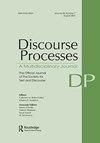追求良好的会话:贡献平衡、共同点和会话结束如何影响会话评估和会话记忆
IF 2.1
2区 心理学
Q2 PSYCHOLOGY, EDUCATIONAL
引用次数: 1
摘要
人们如何判断一段对话是好是坏?会话现象(达成共识、努力平等地贡献、成功地结束会话)会影响对会话质量的判断和对会话的回忆吗?我们测试了阅读先前记录对话的个体在评估对话是好是坏时是否考虑了心理语言特征。此外,我们还测试了这些评估是否会影响对话的记忆方式。格式良好的交互(平衡的、基础的或结构良好的结尾)被评为比格式不良的交互(不平衡的、基础的或结构不良的结尾)更好。当回忆他们看到的最好的互动时,80%的参与者选择了一个形式良好的对话。当回忆他们看到的最糟糕的互动时,90%的人选择了形式不佳的对话。平衡信息对两种判断都很重要。参与者更准确地识别出平衡良好的对话,也更快地识别出平衡良好的对话。相比之下,参与者更能识别出错误的接地,尽管需要更多的时间。格式良好和格式不良的闭包被识别的程度相似,但结构不正确的闭包被识别得更快。这些发现支持了一个假设,即共同点、贡献平衡和会话结束都会影响对会话质量的感知和对先前转录的会话的记忆。本文章由计算机程序翻译,如有差异,请以英文原文为准。
In Pursuit of a Good Conversation: How Contribution Balance, Common Ground, and Conversational Closings Influence Conversation Assessment and Conversational Memory
ABSTRACT How do people determine whether a conversation is good or bad? Do conversational phenomena (reaching common ground, striving to contribute equally, successful conversational closings) influence judgments of conversation quality and recall of conversations? We tested whether individuals reading previously transcribed conversations considered psycholinguistic characteristics in their assessments of whether the conversations were good or bad. Additionally, we tested whether these assessments influenced how the conversations were remembered. Well-formed interactions (balanced, grounded, or with well-structured closings) were rated as better than ill-formed counterparts (not balanced, not well grounded, or with poorly structured closings). When recalling the best interaction they saw, participants chose a well-formed conversation about 80% of the time. When recalling the worst interaction they saw, they chose an ill-formed conversation about 90% of the time. Balance information was important to both judgments. Participants recognized well-balanced conversations more accurately and were also faster to recognize well-balanced conversations. In contrast, participants recognized ill-formed grounding better, although it took more time to do so. Well-formed and ill-formed closings were recognized to a similar degree, but improperly structured closings were recognized more quickly. These findings support the hypothesis that common ground, contribution balance, and conversational closings influence both perception of conversational quality and memory for previously transcribed conversations.
求助全文
通过发布文献求助,成功后即可免费获取论文全文。
去求助
来源期刊

Discourse Processes
Multiple-
CiteScore
4.30
自引率
4.50%
发文量
27
期刊介绍:
Discourse Processes is a multidisciplinary journal providing a forum for cross-fertilization of ideas from diverse disciplines sharing a common interest in discourse--prose comprehension and recall, dialogue analysis, text grammar construction, computer simulation of natural language, cross-cultural comparisons of communicative competence, or related topics. The problems posed by multisentence contexts and the methods required to investigate them, although not always unique to discourse, are sufficiently distinct so as to require an organized mode of scientific interaction made possible through the journal.
 求助内容:
求助内容: 应助结果提醒方式:
应助结果提醒方式:


